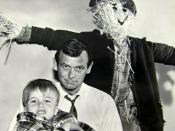The Fugitive: Circumstantial Evidence vs. Hard Evidence In an action-packed thriller that keeps everyone intensely on the edge of their seat, Dr. Richard Kimble's wife is murdered in a scandal over a new drug. Form the order of events that have happened, all evidence points to Dr. Kimble. Sentenced to death, the bus he was on soon comes to a terrible crash, and now Kimble becomes a fugitive on the run. Taking risk into his own hands, will Dr. Kimble be executed, or will he be able to take all of the evidence given to him and prove his innocence? First of all, in this film the police take the circumstantial evidence more seriously than the hard evidence. When Dr. Kimble walked into his house on the night of the murder, he heard a struggle upstairs. He knew this wasn't a good scene for him, but he needed help for his wife.
When the police arrived, they convicted Dr. Kimble too soon before they could investigate the real evidence of this crime and take into consideration that someone else might have been in the house. It seems that they completely over looked that someone else might have caused this, even though Kimble has been saying it wasn't him and he didn't know what the other guy looked like, except he only had one arm. It seems they were more focused on Dr. Kimble being guilty than on taking a real look around at the hard evidence everywhere, like the broken glass and messed up room. They just assumed everything had happened. With the evidence given to the police they arrested him and sentenced him to death completely ignoring his story. It seems that they were only focused on Dr. Kimble and not his story or even taking into consideration that someone else could have possibly done this.
Dr. Kimble knew he was in trouble, because he was being sentenced for a crime that he did not commit. He knew no one was going to believe him, and he knew his chances were over. That all changed when a struggle on the bus broke out and caused a severe accident allowing Kimble to escape. This was his chance to take his evidence that he knew of and prove his own innocence. In other words take his real evidence of what he knew happened and get the police their proof of his innocence. This just would make everything worse for Dr. Kimble. He was now a fugitive on the loose, and it made him appear guiltier in the laws eyes. This would make things more difficult to prove, because at this point the law doesn't care about what he has to say and to the law this was their hard evidence that he was guilty because he was running. Kimble wasn't running though, he was finding more hard evidence for himself, because he didn't know who the guy was, he just had an idea. This is where Dr. Kimble put all of the hard evidence together so he could find his man and prove him guilty. Kimble went at all costs on finding out the truth, where as the police just went by events that had happened. This is what the police should have done before convicting Kimble.
The setting was just bad for Dr. Kimble. It looked like a struggle went on, and there was a murder. He was just in the wrong place at the wrong time. This was circumstantial evidence. Kimble, on the other hand seeing his wife murdered, knowing it wasn't him, and knowing slightly seeing little information about the other guy was all an example of hard evidence. In this, you can clearly see that police went by the circumstances over the hard. This should not happen in a murder trial. Everything should be examined perfectly. Kimble's words should have been taken as if it were the truth.
Both circumstantial and hard evidence play a big role in solving a crime, but people shouldn't focus on one over the other. They should use them both, here both sides of the story and focus on both sides of the story. Films like this may make people wonder about the law system in today's society, but they can keep in mind that this was a film, and crimes like this would most likely be solved the correct way.





